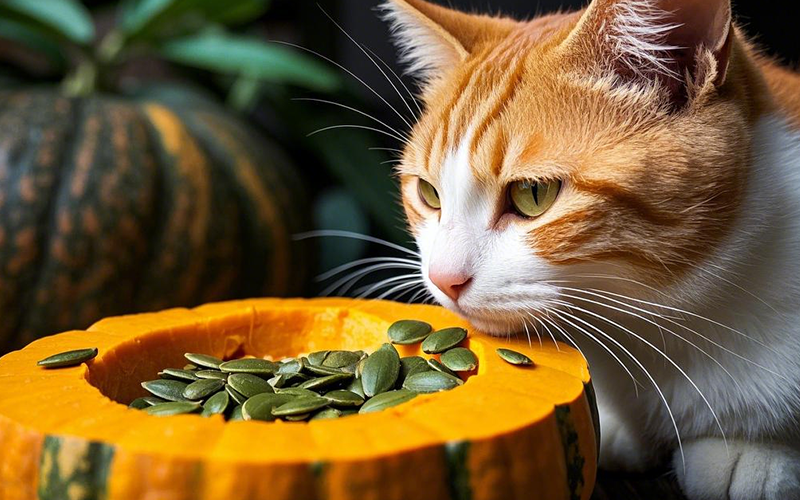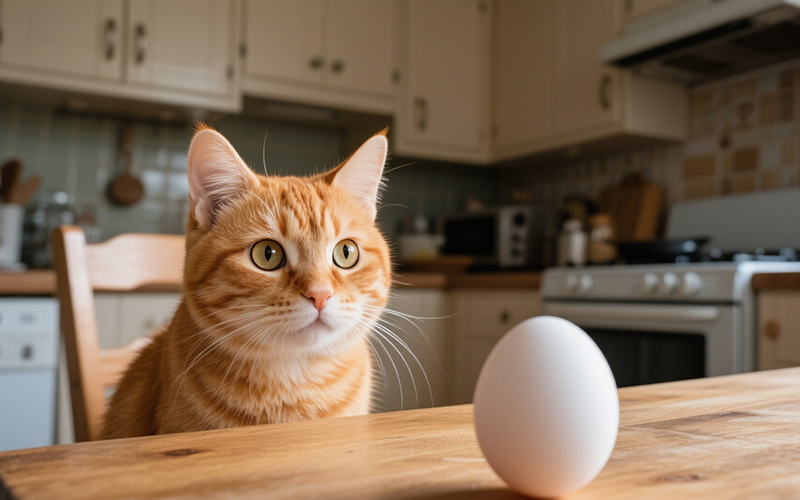Can Cats Eat Pumpkin Seeds? A Comprehensive Guide
- 6 Mar 2025 10:10
As a pet owner, you may wonder if it’s safe to share certain human foods with your cat. Pumpkin seeds are a popular snack for humans due to their health benefits, but what about your feline companion? Can cats eat pumpkin seeds? The answer is yes, but with some important considerations.
In this article, we’ll explore whether pumpkin seeds are safe for cats, the potential benefits, and how to properly prepare them for your pet. We’ll also discuss some precautions to take when feeding pumpkin seeds to your cat.

Are Pumpkin Seeds Safe for Cats?
Generally speaking, pumpkin seeds are not toxic to cats. In fact, they can provide some health benefits when offered in moderation. Pumpkin seeds are high in fiber, protein, and essential fatty acids, which can be good for your cat's overall health. However, just like with any treat or snack, it’s important to offer pumpkin seeds in the right way to avoid any potential risks.
Benefits of Pumpkin Seeds for Cats
High in Nutrients:
Pumpkin seeds contain various nutrients like zinc, magnesium, and iron, which can contribute to your cat’s overall well-being. These nutrients play a role in maintaining a healthy immune system, supporting skin and coat health, and even helping with digestion.
Support Digestive Health:
The fiber in pumpkin seeds can promote healthy digestion. For cats who suffer from occasional constipation or digestive upset, a small amount of pumpkin seeds may help alleviate some symptoms. The fiber content can aid in regulating bowel movements and improving overall gut health.
Rich in Antioxidants:
Pumpkin seeds are a good source of antioxidants, which can help reduce inflammation and protect cells from damage caused by free radicals. This is especially beneficial for older cats or those with chronic health conditions.
Parasite Control:
Some believe that pumpkin seeds can help with intestinal parasites, such as worms, due to the presence of compounds that are thought to paralyze or eliminate the parasites. While pumpkin seeds may help in some cases, they should not replace proper veterinary treatment for parasites.
Precautions When Feeding Pumpkin Seeds to Cats
While pumpkin seeds are generally safe for cats, there are a few things to keep in mind:
1. Moderation is Key
As with any treat, moderation is important. Pumpkin seeds should not be a large part of your cat's diet. Too many seeds could cause an upset stomach, or even lead to weight gain if your cat is regularly given high-calorie treats.
2. Remove the Shells
Pumpkin seeds should be shelled before offering them to your cat. The shells can be difficult for cats to digest and may cause choking or gastrointestinal blockage. Always remove the shells and only offer the soft, edible seed.
3. Avoid Seasoned or Salted Seeds
Salted or seasoned pumpkin seeds should never be fed to your cat. Salt is harmful to cats, and many spices used in seasoning can also be toxic. Stick to plain, unsalted, and unseasoned seeds for your pet’s safety.
4. Watch for Allergies or Sensitivities
Like any new food, pumpkin seeds may cause an allergic reaction in some cats. Watch for signs of digestive upset (vomiting, diarrhea), skin issues, or other abnormal behaviors after giving your cat pumpkin seeds. If any adverse symptoms occur, discontinue feeding them and consult your veterinarian.
How to Feed Pumpkin Seeds to Cats
If you decide to treat your cat to pumpkin seeds, it’s important to prepare them correctly:
Shelled and Plain: Always ensure the pumpkin seeds are unsalted, unseasoned, and shelled. You can buy shelled pumpkin seeds or remove the shells yourself.
Crush or Grind: Since cats can’t easily chew on seeds, it's a good idea to crush or grind the seeds into small pieces before offering them to your cat. This makes it easier for your cat to digest and ensures they get the full nutritional benefit.
Small Portions: Start by offering a small amount—about one or two crushed seeds. Monitor your cat’s reaction and gradually increase the amount if your cat enjoys them and tolerates them well.
Incorporate into Food: You can sprinkle a small amount of crushed pumpkin seeds over your cat's regular food, whether wet or dry. This can make the treat even more enjoyable and provide a healthy boost to their diet.
Alternatives to Pumpkin Seeds for Cats
While pumpkin seeds can offer health benefits, there are plenty of other cat-friendly treats that can also provide similar nutrients and health benefits.
Canned Pumpkin:
If you're looking to support your cat’s digestive health, consider plain canned pumpkin (not the spiced variety used for pies). It’s packed with fiber and can be a great addition to your cat’s diet, particularly for cats with constipation issues.
Cat Grass:
Cat grass is another safe treat for cats. It’s high in fiber and can help with digestion, hairball control, and offering a natural way for your cat to satisfy their instinct to chew.
Other Seeds:
While pumpkin seeds are safe, other seeds, like chia seeds or flaxseeds, can also be beneficial for your cat. These seeds are rich in omega-3 fatty acids and fiber, which can improve your cat’s coat and digestive health.
Commercial Cat Treats:
There are many commercially available treats designed specifically for cats. These treats are formulated to meet your cat’s nutritional needs while offering healthy, safe ingredients.
Final Thoughts: Can Cats Eat Pumpkin Seeds?
In conclusion, yes, cats can eat pumpkin seeds in moderation, provided they are unsalted, unseasoned, and shelled. They offer several health benefits, such as promoting digestive health, supporting immunity, and providing antioxidants. However, like any treat, pumpkin seeds should be given in small quantities and should not replace a balanced, nutritionally complete diet.
Before introducing any new food to your cat, it’s always a good idea to monitor their health and behavior. If you notice any adverse effects, discontinue feeding pumpkin seeds and consult with a professional.
For a more personalized approach to your cat’s health and diet, consider using PettureX, a friendly pet AI assistant that offers 24/7 consultation on pet-related health concerns. PettureX can provide tailored advice and even assist with identifying any issues related to your pet's diet and wellness.
Related

Can Cats Eat Egg Yolk Raw? A Vet's In-Depth Guide to Feline Nutrition & Safety
- 10 Jun 2025
Can Cats Eat Dog Kibble? Unpacking the Nutritional Mismatch!
- 29 May 2025
Can Cats Eat Deli Turkey? Slicing Through the Facts for Your Feline!
- 29 May 2025
Can Cats Eat Deer Meat? Exploring Venison for Your Feline!
- 28 May 2025
Can Cats Eat Corned Beef? Unpacking This Salty Human Delicacy!
- 28 May 2025
Can Cats Eat Cooked Rice? The Grain Truth for Your Feline Friend!
- 27 May 2025
Can Cats Eat Cornbread? A Crumb of Truth for Curious Cat Owners!
- 27 May 2025
Can Cats Eat Cooked Meat? Sizzling Facts for Your Feline's Feast!
- 26 May 2025
Can Cats Eat Chili? Spicing Up the Truth About This Human Dish!
- 26 May 2025
Can Cats Eat Chicken Eggs? Cracking the Code on This Feline Food Query!
- 24 May 2025
